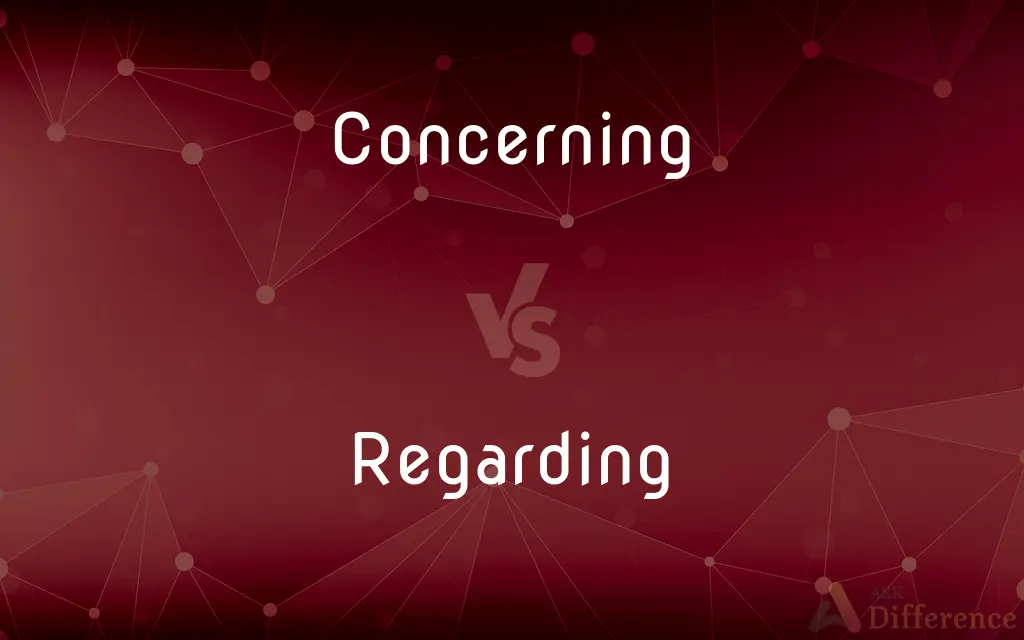Concerning vs. Regarding — What's the Difference?
By Tayyaba Rehman — Updated on October 28, 2023
Concerning and regarding are often interchangeable, used to indicate reference to a topic; "concerning" can also imply worry.

Difference Between Concerning and Regarding
Table of Contents
ADVERTISEMENT
Key Differences
Concerning and regarding are prepositions used to introduce a topic, but concerning can also express worry or unease.
Concerning is sometimes perceived as more formal than regarding, although regarding is widely accepted in both formal and informal contexts.
While regarding neutrally introduces a subject, concerning can carry a connotation of anxiety or distress.
Regarding is often used in business or academic writing to introduce a subject matter, whereas concerning might be used in contexts where issues or problems are discussed.
In some contexts, concerning and regarding can be used interchangeably without changing the meaning, especially when referring to the subject of a discussion.
ADVERTISEMENT
Comparison Chart
Primary Usage
Introduces a topic; can imply worry
Introduces a topic neutrally
Formality
Sometimes seen as more formal
Common in both formal and informal contexts
Connotation
Can imply worry or distress
Neutral, without implications of worry
Contexts
Often used when discussing issues or problems
Used in a variety of contexts including business and academia
Interchangeability
Can often replace regarding
Can often replace concerning
Compare with Definitions
Concerning
Used in formal or official communication.
Concerning the proposed changes, we have some reservations.
Regarding
Making a neutral reference to a subject.
Regarding the meeting schedule, it remains unchanged.
Concerning
Focusing attention on a particular subject.
The meeting concerning budget cuts will start soon.
Regarding
Common in business correspondence.
Regarding our contract, I have attached the amendments.
Concerning
Relating to a specific matter.
Concerning your inquiry, we will respond shortly.
Regarding
Employed in various contexts.
Regarding your email, I agree with your points.
Concerning
Indicating worry or anxiety.
The news concerning the storm is quite troubling.
Regarding
Pertaining to a specific matter.
Regarding your request, we have processed your order.
Concerning
In reference to problems or issues.
Concerning the recent data breach, we are investigating.
Regarding
In reference to; with respect to; concerning. See Usage Note at regard.
Concerning
On the subject of or in connection with; about
We are given little information concerning matters of national security
Regarding
Present participle of regard
Concerning
Causing anxiety; worrying
I find many of the comments very concerning
A concerning breach of security
Regarding
Concerning, respecting.
Concerning
In reference to. See Usage Note at participle.
Regarding
The act by which something is regarded or observed.
Concerning
Causing concern; worrying.
Regarding
Concerning; respecting.
Concerning
(obsolete) Important.
Regarding
Suitable for both formal and informal use.
Just a quick note regarding our plans for Saturday.
Concerning
Regarding, respecting.
Physically, everything is perfect, but concerning your mental state, you have some problems.
Concerning
Present participle of concern
Concerning
That which one is concerned in; one's business.
Concerning
Pertaining to; regarding; having relation to; respecting; as regards.
I have accepted thee concerning this thing.
The Lord hath spoken good concerning Israel.
Concerning
Important.
So great and so concerning truth.
Concerning
That in which one is concerned or interested; concern; affair; interest.
To mix with thy concernments I desist.
Concerning
Importance; moment; consequence.
Let every action of concernment to begun with prayer.
Concerning
Concern; participation; interposition.
He married a daughter to the earl without any other approbation of her father or concernment in it, than suffering him and her come into his presence.
Concerning
Emotion of mind; solicitude; anxiety.
While they are so eager to destroy the fame of others, their ambition is manifest in their concernment.
Common Curiosities
Is concerning more formal than regarding?
It can be perceived as more formal in some contexts.
Can regarding be used to express worry?
No, it's generally neutral and doesn't imply worry.
Does concerning always mean something negative?
Not always, but it can have a connotation of worry.
Are there contexts where concerning and regarding are not interchangeable?
Yes, particularly where concerning implies worry or problems.
Is it grammatically correct to use 'in regarding to'?
No, it should be 'in regard to' or simply 'regarding'.
Does concerning imply responsibility or involvement?
Not necessarily, it primarily introduces a subject.
Are concerning and regarding interchangeable?
Often yes, but concerning can imply worry, unlike regarding.
Is it appropriate to use concerning in informal conversations?
Yes, but regarding might be more common in casual speech.
Can I start an email with concerning or regarding?
Yes, both are appropriate for introducing a topic in emails.
Is regarding suitable for academic writing?
Yes, it's commonly used in academic contexts.
Can concerning be used in business communications?
Yes, especially when addressing issues or concerns.
Is there a difference in tone between concerning and regarding?
Yes, concerning can be more serious or formal.
Are there synonyms for concerning and regarding?
Yes, words like 'pertaining to' or 'with respect to' are similar.
Can regarding start a sentence?
Yes, it can start a sentence when introducing a topic.
Can these words be used in legal documents?
Yes, both are used in legal and official documents.
Share Your Discovery

Previous Comparison
Apoenzyme vs. Proenzyme
Next Comparison
Fee vs. ChargeAuthor Spotlight
Written by
Tayyaba RehmanTayyaba Rehman is a distinguished writer, currently serving as a primary contributor to askdifference.com. As a researcher in semantics and etymology, Tayyaba's passion for the complexity of languages and their distinctions has found a perfect home on the platform. Tayyaba delves into the intricacies of language, distinguishing between commonly confused words and phrases, thereby providing clarity for readers worldwide.















































